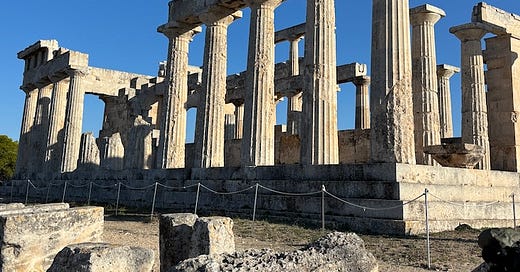What does it mean to “know yourself” and why did Socrates think this was so important?
The response many people give to the question “who are you” is a noun of some sort – “I’m a mother, an artist, a gardener”. Or it’s an adjective – “I’m kind, competitive, strong”.
But Socrates was probably trying to get at the verb (which as we know from school is a “doing” word – “This is how I respond when I’m scared, angry or upset”. In other words “who I am” isn’t fixed, it’s an ever-changing relationship with energy.
Humans don’t like energy. They feel more comfortable with things that are stable and predictable.
As we grow up, we notice what behaviours bring love, praise, or recognition (energy we like). We do more of these things and less of the things that go by unnoticed or result in criticism.
As we repeat this process we disconnect from our creative and experimental energy. We stop ad-libbing and spontaneity. We start playing roles that we’re confident playing. Roles that become familiar. Roles we’re “good” at. Over time these become more fixed. “Who we are” may be apparent to others, but we don’t have access to the energy and creativity we had as children. We’ve made our Faustian pact because the love and approval of others is so delicious.
Instead of learning to master our relationship to energy, most of us were conditioned into believing that there are two categories of good or bad behaviour.
Even fictional characters like Father Christmas reinforce this narrative “Have you been good or bad”. Not to mention family, teachers and God himself, who carved His “rules” into stone tablets.
If our relationship to energy is very problematic, we may choose to break rules or disconnect entirely, revelling in being the loner, rebel or outcast… a look made popular by James Dean in the ‘50s and characterised by the phrase “Nobody ‘gets’ me or “Nobody knows me.”
Socrates (proponent of self-knowledge) who said “the unexamined life is not worth living” was put to death for thinking outside this fixed definition of right or wrong. The authorities didn’t want him to corrupt young minds by contemplating context, paradox, or possibility.
The words “set in stone” have come to mean fixed and unchangeable, which is a problem because as we discovered more about the earth, we realised that a lot of things were very much changeable.
In 1633 (some 2,000 years after the death of Socrates) Galileo was placed under permanent house arrest for his “dangerous” thinking. He proposed that the Earth was not the centre of the universe, it revolved around the sun rather than vice versa.
In 1865 Semmelweis was locked up in a mental asylum for teaching that germs could cause illness and death. Believing that invisible things could spread disease was a clear sign of madness.
Other examples are too numerous to mention. Hundreds of thousands of people have been tortured and burned at the stake for holding “heretical” (ie unorthodox) views.
Perhaps a better lens through which to view “thinking” (instead of determining if it is “right” or “wrong”) would be to determine what kind of energy is driving the thinking… is it driven by Creativity or Survival? – curiosity or fear.
Creative thinking feels expansive and open to possibilities not yet discovered. It’s fluid, so it can move and morph within the context of the present moment. It’s more linked to the future than the past. It doesn’t waste its energy on the dead ends of right and wrong.
Survival thinking is contracted, limited, and suspicious. It’s rigid. It likes to label things, put them in boxes, nail them down (obvious metaphors for coffins and the death of ideas before they’ve fully formed).
Survival thinking is linked to the past rather than the future. It loves data and procedures (by definition, all data is from the past). It isn’t intuitive (connected to the present moment) so it can’t be guided by synchronicity or serendipity.
Without the self-knowledge that Socrates spoke of, we connect our creative brain to our survival brain and use our power of imagination to imagine worst-case scenarios. We can also use our creative brain to imagine more devious ways to be selfish, greedy, or aggressive.
Every day we see situations in which individuals acquire obscene wealth, bribe lobby groups, manipulate data and yet they didn’t do anything “wrong” according to the rules and laws of what constitutes “right and wrong”.
Whenever fearful or powerless feelings arise, people crave the certainty of knowing what’s right and wrong. They listen to the same podcasts, and social media for confirmation. But this is going in the wrong direction. If we don’t get more emotionally intelligent anyone can hijack our survival brain. Advertisers do so on a frequent basis.
The bridge between the creative brain and the survival brain is the heart. For too long we’ve associated the heart with romance and sentimentality. For too long we’ve associated creativity with the lone male genius/nerd. (Zuckerberg, Gates, Musk, Bezos, Don Draper).
If we unlock the power of the heart and learn to master the energy contained within it, we could make an entirely different world. Love is a “doing” word.
It’s important to remember in these times that the most dangerous animal on the planet is a lioness who’s protecting her cubs. By comparison, a lone male, isolated from the tribe, cuts quite a tragic figure.
The old roles of masculine and feminine archetypes are now past their sell-by date. It’s time to birth some new archetypal patterns. If you’re interested in this exploration, join me in Greece, (the birthplace of Socrates!) for a week of creative joy – and fierce love!
Know thyself…
It’s inscribed above the Temple of Delphi and in times like these, we could do with a little oracular wisdom.




